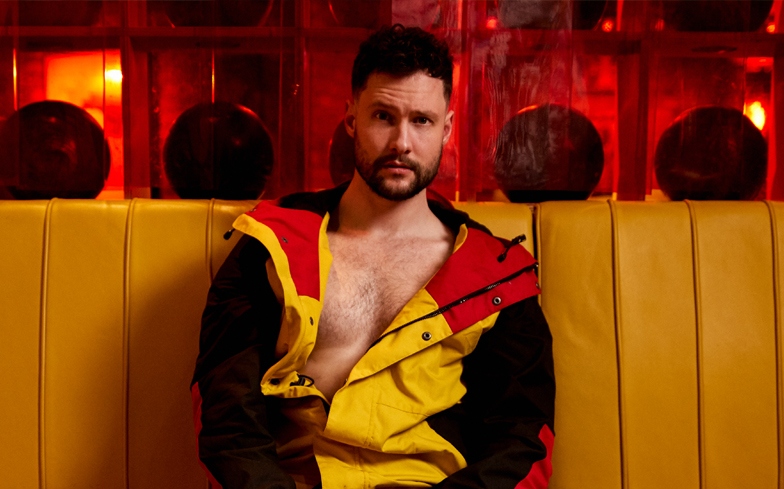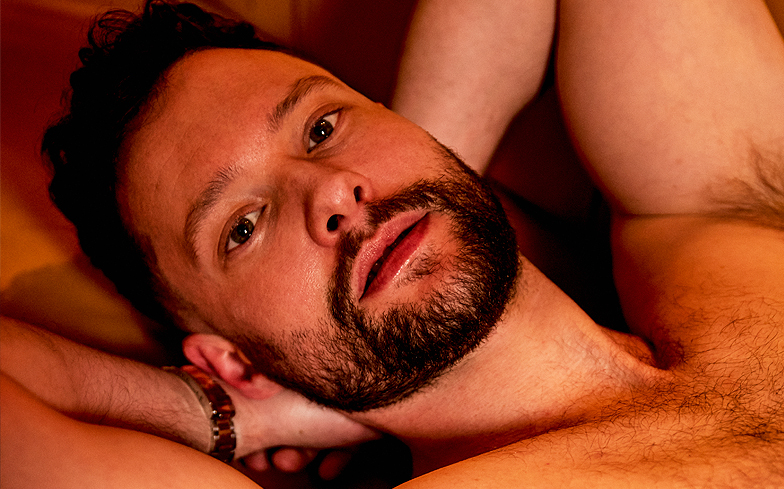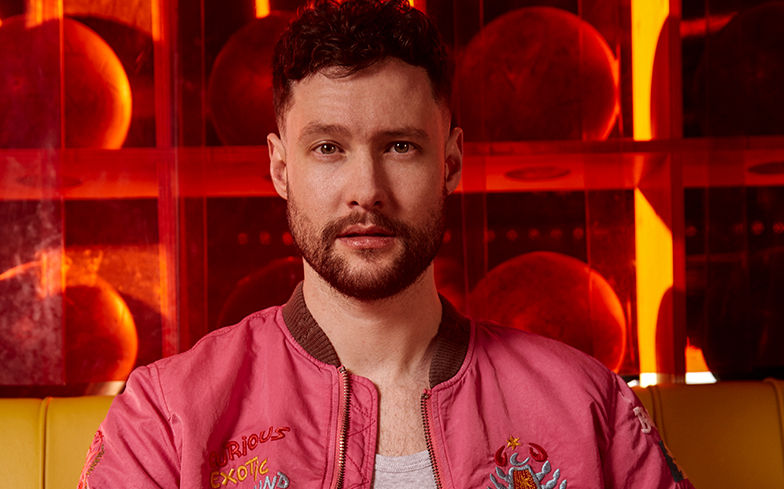
If there were any doubts Calum Scott would be open about his sexuality on his debut album, they are firmly put aside within seconds of pressing play on opening track If Our Love Is Wrong.
“I don’t know how they might take it,” he sings. “Maybe you could take the pressure, and make it disappear?” Most LGBTQ people will instantly recognise those deep feelings of uncertainty – the ones that build inside, niggling at our self esteem as we prepare to come out. Except in this particular instance for Calum, it wasn’t for the first time.
After being catapulted to overnight fame following his audition on Britain’s Got Talent in 2015, the Hull-born singer-songwriter went on to score the biggest song of the summer in the UK the following year with his stripped-down take on Robyn’s Dancing On My Own (500 million streams and counting). It was a surprise hit, and he did it without being picked up for a record deal by Simon Cowell after his time on the ITV talent show. A major deal with Virgin EMI followed instead.
However, while climbing to No.2 on the Official Singles Chart saw Calum achieve something he’d always considered a pipe dream, it meant he was confronted by a whole different nightmare in his personal life.
“I had a lot of troubles with my sexuality growing up, and long story short, when I was in my early teens and I was trying to understand what it was I was going through, I confided in a group of my friends. I was abandoned for it at an early age,” Calum recalls. “So talking about my sexuality has always made me feel like I’m going to lose people, because of that traumatic experience when I was a young kid.” Now Calum was fast becoming famous, he knew that he’d have to go through the whole process again, but this time in much more public forum.
“If Our Love Is Wrong is kind of my way of explaining the debate in my head about whether I should come out in the press as I was terrified of what people might think of me. How their opinion might change of me. So it was that argument I was having internally,” he explains at a bowling alley in West London, which today serves as the backdrop for Calum’s first ever Gay Times cover shoot. “Eventually it came to a point where I was talking about it in a songwriting session, and it was like counselling. As I was talking about it, on reflection I was starting to think, ‘Actually, if me being gay is wrong, then I don’t want to be right.’ So it’s kind of an empowering song.” It was a gay friend who then helped him through this very turbulent period in his life.

© William Baker for Gay Times
“He helped me come out to my mum and the rest of my family,” Calum says. “From there in, I was quite happy. That must have been at around 15.”
Once his family and close friends knew, you’d think a large part of that pressure closeted LGBTQ people battle with would have lifted, but Calum was still struggling inside. “At first I was so ashamed of myself and then the more people I told, the more comfortable I felt,” he explains. “But on a wider scale, I was still not out by this point. So my close family and friends knew, but I was scared to let it go any further than that. For it to be common knowledge just worried the hell out of me.”
Looking back, he puts most of that fear down to teenage insecurities. “In a certain way I suppose I was just terrified about what other people thought of me,” he says. “At that age, everything is about what people think and how you appear. It’s a struggle because when you’re young, you are obsessed with your appearance and your peers and how people perceive you.”
But he also suggests that, at the turn of the millennium, being a gay man in the public eye usually meant flamboyant style and eccentric personalities. There was very little representation of an ‘everyday man’ who just so happened to be gay in mainstream culture. “My gay role models were people like Elton John, George Michael and Boy George, which I couldn’t relate to,” Calum says. “So it made me feel even more alien. Whereas now there are so many people who are open and proud of who they are, that are more relatable.”
It’s being a relatable role model for the LGBTQ youth of today – and the community in general – that Calum hopes he can be with his debut album Only Human, which is out now. All of that fear, pain and recovery has been channeled into his first studio collection, following the journey of a gay man who has finally embraced who he is. “The message people are getting straight away is ‘I am who I am. I’ve tortured myself enough about it. Now it’s time for me to be confident and accept it and be happy.’”
That sentiment is most poignantly laid out in one of the album’s more rousing numbers. “If I could go back, to when you were lonely, I’d be there to hold your hand,” Calum sings on Good To You over a stomping beat and flourishes of electronics, coming together to form an empowering LGBTQ anthem. “The question in the songwriting session was: If you were to go back in time and change anything, would you do it?” Calum explains. “I’d said, if I was to go back in time, I wouldn’t want to change anything. I would just say to my younger self, ‘I’ll be good to you. As you grow up you’ll go through things, you’ll lose sleep, you’ll cry, you’ll feel like there’s nobody there for you, but I’ll be good to you. When you grow up you’ll never feel more confident and happy about where you’re at.’ I’m kind of glad I went through the whole experience of being abandoned and feeling very lonely, confused and upset, wishing I was straight. I had that whole, ‘If I had a straight pill, would I take it?’ I always said I would. Whereas now I would bat it out of somebody’s hands and be like, ‘Are you mad? It’s great to be gay. It’s perfect to me.’”
Calum puts his paternal nature down to having always been the older brother. At heart he’s protective and supportive of people who need it. “I suppose this is me putting that through my music,” he says. “I’m very soppy and sensitive!” So when he got into the studio and, like all artists craving a hit to appeal to the widest possible audience, started to write songs about partying, it just didn’t feel right.
“I knew there was something deeper I had to write about,” he explains. “When I was honest about myself and my feelings and especially my sexuality, it started flowing out of me like a river. I was writing about my experiences of being gay, of hiding it away, of telling my parents, coming out to the press, the circumstance where I was abandoned – all these different experiences in the hope that if I write these things and I’m honest, even if one person is like, ‘He did it and he was terrified of what people would think but had the strength, maybe I will.’ If it inspires one person, then all of those things I went through was completely worth it.”
This, Calum suggests, is how he hopes to continue to instill a change in attitudes towards LGBTQ people – especially if it helps those most vulnerable who are coming to terms with their own sexuality. “I’m not a flag-bearer of the gay community in terms of leading the march, but I’m definitely active in trying to help people be themselves,” he says. He’s adamant that the education of understanding and accepting the LGBTQ community needs to start way earlier than it currently does.
Although rates of anti-gay bullying in schools in the UK have fallen in the past decade, in 2017 Stonewall reported that 45% of LGBTQ pupils said they had experienced abuse because of who they are. “If kids are taught that – y’know, when you look in a textbook it’s always mummy and daddy and their children – if that was daddy and daddy or mummy and mummy, at a young age it would allow the child to have an understanding that there are same-sex couples who love each other just as much as a man and woman can,” Calum says. “I think if it starts early at school it would have a knock-on effect and kids would be more aware, so that misconception and misunderstanding of the LGBTQ community would hopefully be eradicated. If it can start at that young age, it’s just better for everybody.”
That understanding needs to infiltrate older generations too, though. We don’t have to remind you that coming out for an LGBTQ person isn’t a one-time experience. We’re having to navigate other people’s perceptions on a daily basis. Even when you’ve had a huge hit and spoken openly about your sexuality in the press, you can’t escape that. “There have been times where I’ve had to come out again,” Calum reveals. “I wouldn’t say it’s frustrating, but it does make me wish there was a time where people don’t have to come out. I did a radio interview the other day and he said, ‘Oh you just touched upon your sexuality there – are you gay?’ It was like having to go through all those feelings again and I started feeling nervous. It brings back all those things I thought I was liberated from. But I feel more and more empowered the more I do it. At first, coming out more than once would have terrified the life out of me. When he said, ‘So are you gay?’ I was like, ‘Yes! I’m very gay and I’m very proud.’ It just makes me feel so confident that I’m now taking something that I was terrified of and using it as a drive.”

© William Baker for Gay Times
On the way, Calum has slowly adapted to lifestyle in the public domain. His cover of Dancing On My Own secured him recognition from global stars like Ed Sheeran and Chic’s Nile Rodgers, who he still can’t believe knows who he is. He also – finally! – got the thumbs up from Robyn for covering her song. “I met with a guy called Patrick Berger who is the other songwriter on that record, and I said, ‘I’m glad that you love this new life that’s been breathed into it, but does Robyn like it?’ I had reached out, but never managed to get hold of her. She did say to Patrick that she’s given the thumbs up to my version, so I was like, ‘Thank god! I can sleep easy.’ It was finally a sigh of relief after a year and a half.”
But not all of Calum’s superstar encounters have been smooth. “When I was introduced to Katy Perry, I was like, ‘Oh my god – this is insane.’ I had a selfie with her and was fangirling like mad,” he laughs. “I actually stopped her from going to the toilet and I was like, ‘What do you need – a wee or a poo?’ And she was like, ‘Oh, wouldn’t you like to know’ and then laughed. There was a little bit of a moment there where I was like, ‘Oh my god, she doesn’t get my sense of humour. I shouldn’t be too Yorkshire!’”
Another adjustment area in Calum’s life has been the world of dating. When he first came to rise on Britain’s Got Talent, he struggled when the British press assumed he was straight. It meant that, although he was on dating apps like Tinder, if he matched with a guy and they recognised who he was, he just went quiet for fear of being publicly outed before he was ready. “The dating game for me was completely shut off until I could come to terms with it,” he recalls.
But when the time came and dating men was back on the cards, it still didn’t quite go to plan, as his new song Hotel Room informs us. “It’s about me falling in love with this straight guy who, after seeing all the signs and thinking this is really going to work, he goes ‘Oh, I’m not gay’ after I made a pass at him,” he says. “It’s heartbreaking!”
Our Gay Times cover star didn’t sit around crying over it for too long though, and despite a packed year ahead with his new album release and a headline European tour, a fully confident and upbeat Calum Scott is still very much on the search for Mr. Right. “I’m still looking. I’m still on Tinder, I’m still on Chappy, I’m still single,” he smiles, adding that he’s proud to be an “aspiring otter”.
C’mon boys, don’t leave him dancing on his own for too long.
Photography William Baker
Fashion Kamran Rajut
Grooming Josh Knight



